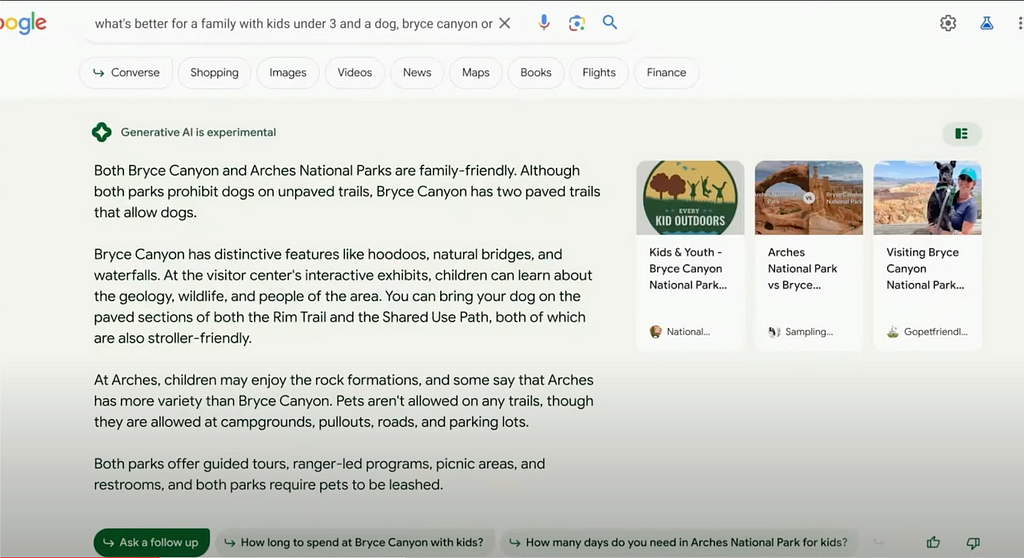Search generative experience and the content concern.
Google’s new usage of Generative AI in its search engine is coined as Search Generative Experience (SGE). SGE has created a concern: The content concern. The question is, if people will stop making content for the web, because SGE is automatically generating answers from this very same content? In this article, I discuss how SGE uses content and the three reasons why humanly created content is not disappearing on the web. [1]
How SGE uses content
SGE is incorporated in Google’s search engine (so far, in the US only) as an explanatory field below the search bar. SGE delivers its explanations by scraping content from websites. This allows SGE to answer long questions:

As a consequence users can stay on Google and read the automatically generated explanation by SGE, situated right below the search bar — above the search hits. This can motivate users to not consult the websites that the search engine lists as hits, below the SGE generated explanation. Such a setup may be comfortable for the end user, but if vital website traffic is lost due to SGE making it pointless to visit websites, it raises the question:
Will users stop creating content on the web because of SGE?
CEO of Google Sundar Pichai has already been challenged in person about the content concern by Nilay Patel on The Decoder. [2] Not surprisingly, Pichai argues that web content will keep getting created. It is reasonable to believe that Pichai is right.
The following is my own analysis of why users will keep creating content on the web, supporting Pichai’s assumptions. All in all, three things are at play:
- The inflated value proposition from GenAI
- Information behavior
- The general decay of the web
The inflated value proposition from GenAI. Generative AI was hyped as “a new day for search” by Microsoft CEO Satya Nadella on February 7th 2023, [3] when Microsoft joined forces with OpenAI. With the expression “a new day in search”, Nadella was challenging Google: Microsoft was powering their search engine Bing with conversational search in a chatbot supported by OpenAI. However, 17 months after the launch, it is obvious that Bing is not taking significant market share from Google. [4] It was not — as inflated GenAI hopes would make believe — a new day for search. SGE is in itself an expression of GenAI not being able to deliver the immense value imagined in late 2022, early 2023. SGE is a more discrete expression of conversational search that is included into the search bar, not as a separate chatbot. As such, the capability of SGE seems more logical and well-conceived than chatbots — and less impactful, in light of what was expected a year and a half ago. This indicates a less substantial change in global search behavior, caused by SGE, and therefore, content on the web is likely to not be substantially exploited by SGE, which again suggests that content will keep being created.
Information behavior. Even though users could stay on Google’s platform reading only SGE generated explanations, it is very unlikely that they actually will. The idea of users not navigating towards sources is deterministic and defies scientific studies of Information Behavior — how people actually search. [5] Without empirical evidence, you could just as well argue that high quality, humanly created content would pull users towards websites outside of Google’s platform, instead of being satisfied with an SGE explanation, that is likely to not hold the same quality.
The general decay of the web. Google is using GenAI to experiment with SGE. But companies around the world are also experimenting with GenAI. And they are doing so to affect their ranking in the context of traditional search engine mechanics. Companies are filling up their websites with GenAI created content that is often deeply irrelevant for the products and services these companies offer. This will help them rank higher amongst traditional search engine hits. So, not only is GenAI beginning to create the answers for peoples searches, it is also beginning to create the sources, from which the answers are generated. Accordingly, a plethora of podcasts and papers have been released on the decay of Google’s search engine, claiming that the introduction of SGE is the final stage towards Google losing it’s search monopoly of the web, because of poor quality, irrelevant search hits and simply straight up wrong answers in SGE. [6] This may not be of benefit to Google, but it suggests that humanly created content will still hold immense value in the future.
Takeaways
It is unlikely that SGE will make high-quality, human created content disappear on the web, for three reasons:
Firstly, SGE is a implicit result of the inflated value proposition from GenAI. Statistics show that the “new day in search” by adding GenAI powered chatbots to search engines, is not happening.
Secondly, basic scientific studies in Information Behavior further solidifies that you cannot exclude a behavior where people move towards the high-quality sources, instead of being satisfied with SGE answers of lower quality.
Thirdly, and finally, SGE is only a piece to a larger puzzle of GenAI creating both questions and answers of artificial nature. It will not be commercially interesting in the long run, as the quality will diminish over time without humanly created content — that will therefore still hold immense value.
What’s next?
Stay tuned for my last article on Search Generative Experience, that will discuss what SGE may imply for data catalogs — search engines for data in companies.
[1] This is a follow up article on: O. Olesen-Bagneux: The Winning Architecture of Search Generative Experience, Analyst’s Corner, May 24th 2024. I will publish a third article on SGE’s possible consequences for data catalogs.
[2] Decoder Podcast, May 20th 2024: Google’s Sundar Pichai on AI-powered search and the future of the web
[3] NPR, Feb 7th, 2023: Microsoft revamps Bing search engine to use artificial intelligence
[4] Search Engine Land, May 5th, 2024: Google’s huge search market share loss wasn’t real: Data revised
[5] Wikipedia, “Information Behavior”
[6] The 404 Media Podcast, May 29th, 2024: Google Somehow Got Even More Shit
Will people stop creating content on the web because of Google’s AI search results? was originally published in UX Collective on Medium, where people are continuing the conversation by highlighting and responding to this story.


Leave a Reply